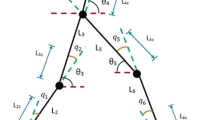Abstract
Motional stability and robustness play a very important role mainly in bipedal robots, especially if it is connected with a dynamic environment, where many motion changes are necessary to be done. Here, this problem is shown on kicking a ball in robotic soccer. The movement control leads to constructing movement trajectories which should secure stable behaviour. Some control approaches are oriented in creating smooth trajectories instead of complicated stability analyses. For such purposes the so-called Bézier curves are used. In this paper we use Fuzzy Cognitive Maps (FCMs) for determining parameters of Bézier curves as well as a Particle Swarm Optimization (PSO) algorithm for learning FCMs. The main advantages of PSO consist in their speed and necessity of a relatively small training set. Two types of a kicking system for generating smooth movement trajectories are proposed and compared in the paper, which is documented by performed experiments.
Access this chapter
Tax calculation will be finalised at checkout
Purchases are for personal use only
Preview
Unable to display preview. Download preview PDF.
Similar content being viewed by others
References
Akgun, B., Cakmak, M., Yoo, J.W., Thomaz, A.L.: Trajectories and key frames for kinesthetic teaching: a human-robot interaction perspective. In: Proceedings of the Seventh Annual ACM/IEEE International Conference on Human-Robot Interaction, HRI 2012, pp. 391–398. ACM, New York (2012)
Antonelli, M., Dalla Libera, F., Menegatti, E., Minato, T., Ishiguro, H.: Intuitive humanoid motion generation joining user-defined key-frames and automatic learning. In: Iocchi, L., Matsubara, H., Weitzenfeld, A., Zhou, C. (eds.) RoboCup 2008. LNCS (LNAI), vol. 5399, pp. 13–24. Springer, Heidelberg (2009)
Clerc, M.: Particle Swarm Optimization. Wiley (2006)
Czarnetzki, S., Kerner, S., Klagges, D.: Combining key frame based motion design with controlled movement execution. In: Baltes, J., Lagoudakis, M.G., Naruse, T., Ghidary, S.S. (eds.) RoboCup 2009. LNCS (LNAI), vol. 5949, pp. 58–68. Springer, Heidelberg (2010)
Glykas, M. (ed.): Fuzzy Cognitive Maps. STUDFUZZ, vol. 247. Springer, Heidelberg (2010)
Graf, C., Härtl, A., Röfer, T., Laue, T.: A robust closed-loop gait for the standard platform league humanoid. In: Zhou, C., Pagello, E., Menegatti, E., Behnke, S., Röfer, T. (eds.) Proceedings of the Fourth Workshop on Humanoid Soccer Robots in Conjunction with the 2009 IEEE-RAS International Conference on Humanoid Robots, Paris, France, pp. 30–37 (2009)
Johanyák, Z.C., Kovács, S.: A brief survey and comparison on various interpolation-based fuzzy reasoning methods. Acta Polytechnica Hungarica 3(1), 91–105 (2006)
Kennedy, J., Eberhart, R.C., Shi, Y.: Swarm intelligence. Morgan Kaufmann series in evolutionary computation. Morgan Kaufman Publishers, San Francisco (2001)
Mellmann, H., Xu, Y.: Adaptive motion control with visual feedback for a humanoid robot. In: Proc. of IEEE/RSJ International Conference on Intelligent Robots and Systems (IROS), pp. 3169–3174 (2010)
Müller, J., Laue, T., Röfer, T.: Kicking a ball – modelling complex dynamic motions for humanoid robots. In: Ruiz-del-Solar, J. (ed.) RoboCup 2010. LNCS (LNAI), vol. 6556, pp. 109–120. Springer, Heidelberg (2010)
Papageorgiou, E.: Learning algorithms for fuzzy cognitive maps: A review study. IEEE Transactions on Systems, Man, and Cybernetics, Part C: Applications and Reviews 42(2), 150–163 (2012)
Papageorgiou, E., Salmeron, J.: A review of fuzzy cognitive maps research during the last decade. IEEE Transactions on Fuzzy Systems 21(1), 66–79 (2013)
Papageorgiou, E.I., Parsopoulos, K.E., Stylios, C.D., Groumpos, P.P., Vrahatis, M.N.: Fuzzy cognitive maps learning using particle swarm optimization. International Journal of Intelligent Information Systems 25(1), 95–121 (2005)
Precup, R.E., Preitl, S.: Optimisation criteria in development of fuzzy controllers with dynamics. Engineering Applications of Artificial Intelligence 17(6), 661–674 (2004)
Author information
Authors and Affiliations
Corresponding author
Editor information
Editors and Affiliations
Rights and permissions
Copyright information
© 2015 Springer International Publishing Switzerland
About this paper
Cite this paper
Vaščák, J., Michna, R. (2015). Learning of Fuzzy Cognitive Maps by a PSO Algorithm for Movement Adjustment of Robots. In: Sinčák, P., Hartono, P., Virčíková, M., Vaščák, J., Jakša, R. (eds) Emergent Trends in Robotics and Intelligent Systems. Advances in Intelligent Systems and Computing, vol 316. Springer, Cham. https://doi.org/10.1007/978-3-319-10783-7_17
Download citation
DOI: https://doi.org/10.1007/978-3-319-10783-7_17
Publisher Name: Springer, Cham
Print ISBN: 978-3-319-10782-0
Online ISBN: 978-3-319-10783-7
eBook Packages: EngineeringEngineering (R0)




